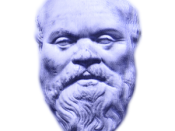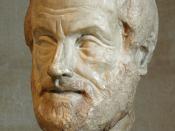Aquinas' conception of the nature of the soul consists of two main elements. Firstly, that as the first principle of life which is the form of the human being, it is necessarily incorporeal. Secondly as the principle of all intellective activity in human beings it must be described as subsistent. The first element can be described as thoroughly Aristotelian; the second element is Aquinas' way of reconciling the Aristotelian notion of what it is to be a human, with the definite Christian insistence of the dual nature of human beings as spiritual and corporeal. Without Aquinas' theory of the subsistence of the human soul the two would be at odds with one another, however it is clear that there is a certain amount of tautology within his notion, yet at the same time Aquinas uses notions from Aristotle's metaphysics to defend his position. The above will be shown by explaining the two elements of Aquinas' conception of the human soul from the first two articles in Summa 1a75 articles one and two.
The final part of the essay will focus on Aquinas's justification of his subsistence theory, although modern scholarship has much to say on the validity of this argument, it is not within the scope of this essay to explore it, what shall be shown is how Aquinas has used the tools of Aristotelianism to form his doctrine.
Aquinas' first move in formulating his conception of the soul is by identifying it as the first principle of life as we describe those things which live as, "animate" or as Pasnau translates animata "ensouled", animate and ensouled are therefore interchangeable terms. His point is that we presuppose the existence of the soul, as it is that which explains something to be alive. The question...


